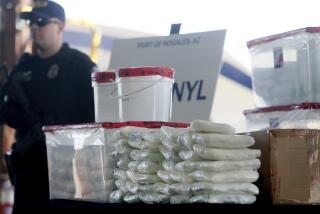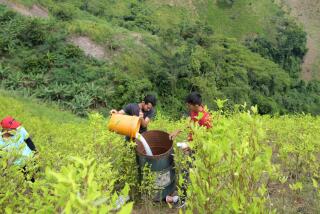U.S. to shift approach to Afghanistan’s drug trade
- Share via
TRIESTE, ITALY — The United States is shifting its strategy against Afghanistan’s drug trade, phasing out funding for opium eradication while boosting efforts to fight trafficking and promote alternate crops, the U.S. envoy for the region said Saturday.
The aim of the new policy: to deprive the Taliban of the tens of millions of dollars in drug revenue that is fueling its insurgency.
Richard C. Holbrooke, the U.S. special envoy for Afghanistan and Pakistan, told the Associated Press that poppy eradication -- for years a cornerstone of U.S. and U.N. drug trafficking efforts in Afghanistan -- was not working and was driving farmers into the hands of the Taliban.
“Eradication is a waste of money,” Holbrooke said on the sidelines of a Group of 8 foreign ministers’ meeting on Afghanistan in Trieste, Italy, during which he briefed regional representatives on the new policy.
“It might destroy some acreage, but it didn’t reduce the amount of money the Taliban got by one dollar. It just helped the Taliban. So we’re going to phase out eradication,” he said. The Afghan foreign minister also attended the G-8 meeting.
Eradication efforts were seen as inefficient because too little was being destroyed at too high a cost, United Nations drug chief Antonio Maria Costa said.
The old policy was also deeply unpopular among small-scale farmers, who often were targeted in the eradication efforts.
Afghanistan is the world’s leading source of opium, cultivating 93% of the world’s heroin-producing crop. Though opium cultivation dropped 19% last year, it remains concentrated in the country’s southern provinces, where the Taliban is strongest, and last year earned insurgents an estimated $50 million to $70 million, according to the U.N. Office on Drugs and Crime.
There was no comment from the Afghan government Saturday, but the U.S. policy shift is likely to be welcomed. Officials eradicating opium poppies have often been attacked by militants. Afghan citizens, many of whom rely on farming for sustenance and income, are certain to welcome new agricultural programs.
In recent months, U.S. and NATO troops in Afghanistan have begun attacking drug labs and opium storage sites in an effort to deprive the Taliban of drug profits.
More to Read
Sign up for Essential California
The most important California stories and recommendations in your inbox every morning.
You may occasionally receive promotional content from the Los Angeles Times.













